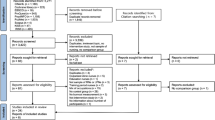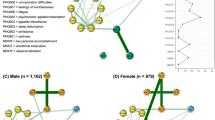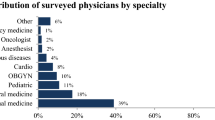Abstract
The prevalence and causes of 'burnout' and psychiatric disorder among senior oncologists and palliative care specialists have been measured in a national questionnaire-based survey. All consultant non-surgical oncologists in the UK were asked to participate. Sources of work-related stress and satisfaction were measured using study-specific questions which were aggregated into factors. Psychiatric disorder was estimated using the 12-item General Health Questionnaire. The three components of 'burnout'--emotional exhaustion, depersonalisation and low personal accomplishment--were assessed using the Maslach Burnout Inventory. Three hundred and ninety-three out of 476 (83%) consultants returned their questionnaires. The estimated prevalence of psychiatric disorder in cancer clinicians was 28%, and this is similar to the rate among British junior house officers. The study group had equivalent levels of emotional exhaustion and low personal accomplishment to those found in American doctors and nurses, but lower levels of depersonalisation. Among cancer clinicians, 'burnout' was more prevalent among clinical oncologists than among medical oncologists and palliative care specialists. Psychiatric disorder was independently associated with the stress of feeling overloaded (P < 0.0001), dealing with treatment toxicity/errors (P < 0.004) and deriving little satisfaction from professional status/esteem (P = 0.002). 'Burnout' was also related to these factors, and in addition was associated with high stress and low satisfaction from dealing with patients, and with low satisfaction from having adequate resources (each at a level of P < or = 0.002). Clinicians who felt insufficiently trained in communication and management skills had significantly higher levels of distress than those who felt sufficiently trained. If 'burnout' and psychiatric disorder among cancer clinicians are to be reduced, increased resources will be required to lessen overload and to improve training in communication and management skills.
This is a preview of subscription content, access via your institution
Access options
Subscribe to this journal
Receive 24 print issues and online access
$259.00 per year
only $10.79 per issue
Buy this article
- Purchase on Springer Link
- Instant access to full article PDF
Prices may be subject to local taxes which are calculated during checkout
Similar content being viewed by others
Author information
Authors and Affiliations
Rights and permissions
About this article
Cite this article
Ramirez, A., Graham, J., Richards, M. et al. Burnout and psychiatric disorder among cancer clinicians. Br J Cancer 71, 1263–1269 (1995). https://doi.org/10.1038/bjc.1995.244
Issue Date:
DOI: https://doi.org/10.1038/bjc.1995.244
This article is cited by
-
Are Perfectionistic Standards Associated with Burnout? Multidimensional Perfectionism and Compassion Experiences Among Professional MFTs
Contemporary Family Therapy (2023)
-
Prevalence and correlates of burnout among physicians in a developing country facing multi-layered crises: a cross-sectional study
Scientific Reports (2022)
-
Communication Skills Training for Internal Medicine Residents Using a Brief Animated Video
Journal of Cancer Education (2022)
-
Complex conversations in a healthcare setting: experiences from an interprofessional workshop on clinician-patient communication skills
BMC Medical Education (2021)
-
Effectiveness of a Multiprofessional, Online and Simulation-Based Difficult Conversations Training Program on Self-Perceived Competence of Oncology Healthcare Provider Trainees
Journal of Cancer Education (2021)



